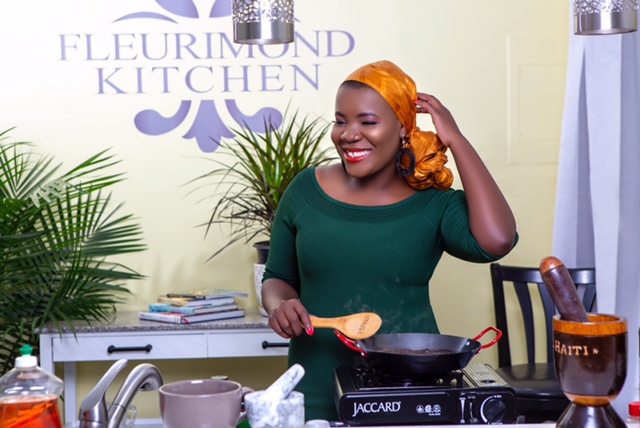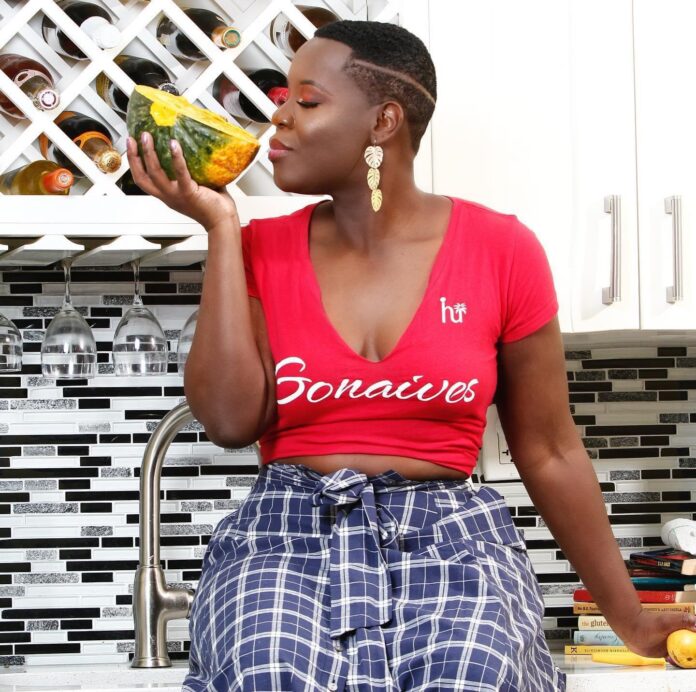( ENSPIRE Lifestyle ) CEO and Culinary Master Nadege Fleurimond Is Highlighting Haitian Art and Culture With Her New Apparel
ENSPIRE Contributor: Anastasia Hanna
With the debut of her new apron line, Nadege Fleurimond, a passionate entrepreneur and author of Haiti Uncovered: A Regional Adventure Into the Art of Haitian Cuisine, mixes the richness of Haitian art and culture to inspire home chefs to walk into the kitchen boldly. Carabella denim, a reflection of Haiti’s culture and rich past, inspired the embroidered aprons. The published author and entrepreneur wants to promote her heritage by using food as a global language to bring people together all across the world.
The apron is a major cooking tool used by millions of chefs and cooks across the world. This unique cultural line of aprons helps users feel good while bringing more fun into the cooking experience. The aprons are carefully designed using durable denim material with embroidered artwork by artist Gracie Xavier. The aprons are available to accommodate the entire family for both adults and children.

Nadege Fleurimond has also made the headlines over the years as a culinary expert, recently publishing a new book titled Taste of Solitude: A Culinary Journal, where she chronicles her self-discovery journey as she cooked her way through the COVID-19 pandemic lockdown. She has been featured on several media outlets, including the Food Network’s Chopped and popular publications like Epicurious, Food and Wine, and Conde Nast Travel.
ENSPIRE Magazine interviewed Chef Nadege Fleurimond to discuss her books, her brand new apron line, her journey to becoming a chef and her subsequent success, her company ROAR, and much more!
Can you tell me a bit about your two books Haiti Uncovered: A Regional Adventure Into the Art of Haitian Cuisine and Taste of Solitude: A Culinary Journal? What are some of the most important points from these two books?
Haiti Uncovered was a journey. It was a journey to really discover Haitian food at its roots and on the ground. When the idea to capture the traditional/regional cuisines of Haiti came to me, I didn’t want to just ask Haitians in New York. I felt it was important to go and explore; to get to the root of it all. I think maintaining traditions is important even while living abroad, and in order to do that, I wanted to get it from the source. So, I think of Haiti Uncovered as a culinary bible, but also as a great opportunity for anyone to learn a bit more about Haiti and see the universal language of food at play.
Taste of Solitude was such an impromptu project. It’s one that derived out of the times we were living in. COVID-19 took us all for a shock and food served as my therapy. The process of cooking, but also sharing, those dishes with my audience live daily via social media made the times less trying. But also, 2020 was also a year of reflection. With this experience, we also got the opportunity to know ourselves just a bit more deeply. And Taste of Solitude is a melange of all that, while adding the element of my love of global comfort cuisines. It’s global comfort recipes through my eyes and the lessons that came along in those early trying days of the pandemic.

Tell me a little about your new apparel line, the Carabella aprons. What was the inspiration behind this line? Why did you choose aprons? What about these aprons represents Haitian tradition and heritage?
I think perhaps the apron is the single most universal kitchen tool staple. It’s used around the world and really signifies food. And in everything I do, I am always looking for ways to highlight Haitian culture through food. I’ve always loved the simplicity yet beauty of the traditional Haitian peasant dress known as the Carabella/Karabela. It was natural for me to highlight it in my design and use Haitian art. Besides food, Haitian art is another realm that really gives a full perspective of Haitian culture and traditions. Haiti is a tiny country, but it has such a rich history that has touched so many corners and people of this globe, so any opportunity to highlight it, I will.
Can you tell me about your cooking education? I understand you learned to cook from your father. Did he motivate you to become a chef? What else drives you to continue pursuing your passion? Why do you think food connects people?
Oh, my dad hated and hates the idea of me cooking for a living. To this day he says to me, I can’t believe you have an Ivy League degree and you are cooking for a living. I have to laugh because I understand he comes from a different time and place. I had to learn to not take it personally. Food was not respected as a profession in his time and did not provide the financial security that progressions such as medicine or law did.

Learning to cook from my dad at an early age, I associated food as camaraderie. He would be playing cards and dominos with his friends and I’d bring out dishes, and they’d marvel at how such a young kid (I was 8) was able to create such dishes. In retrospect, it makes sense catering is the path I chose. My dad was a single dad, so usually it was just me and him. And cooking seemed like a chore at those times. But when he had friends over, it was a party. And that made it fun. I started to associate food with the idea of entertainment and togetherness.
Tell me about your company ROAR. When was it established? How does your company help empower others? How did you come up with the name?
ROAR, which stands for Reach, Organize, Act, and Realize, is an idea I had over a decade ago because I was always the go-to person for all my friends who wanted solutions. I was always a bit more “wise” in how I viewed things. I was always that annoying, practical, logical friend that no one wants to hear but needed to hear.
It wasn’t until 2017 that I formally established my company because friends wanted me to stop giving free advice and guidance. I was always helping people level up for free. They ordered me to stop. The thing about me is, I’m a great listener. So I stopped and really started structuring how I would like to work with entrepreneurs to help them utilize their passions and skills to create thriving businesses they loved. I am so blessed to live and work my passions. I want others to do the same.
The name came about because the Columbia University mascot is a lion. And I was like oh wouldn’t it be nice if I could make the ROAR of the line actually stand for something meaningful? Boom! ?

Have you faced any challenges with your company during the COVID-19 pandemic? If so, what were they and how did you overcome them? Would you say that the pandemic is the perfect time to start a business? Why or why not?
The early months of COVID were difficult on all fronts. All my businesses were on stand still. No events, no gatherings, no real estate. Clients were charging back payments for events, thinking they wouldn’t be able to host functions. It was a mess, but I always say one of the key traits of entrepreneurship is innovation—the ability to be able to see in and through what is happening.
I utilized the time to really focus on other things, hence why the apron line I had always wanted to do came to fruition during the pandemic. I wrote a new book. Although that was not in the plans, I saw the fact that everyone was at home, cooking and rallying around great dishes.
I think anytime is the perfect time to start a business once you understand the landscape and what you bring to it.

You’ve been featured in various media outlets, from Food Network’s Chopped to digital publications like Epicurious, Food and Wine Magazine, and Conde Nast Travel. What were your thoughts being featured in these outlets? How long did it take before you were featured in popular media outlets?
I love these media features because we live in a world where people really do get their knowledge and information from reading, watching television, and social media. So, any opportunity I get to highlight the positivity, I want to share about entrepreneurship, Haiti, life, and lessons learned. I’m always excited to do so. Oftentimes, someone reading something in these magazines is the first time they may be exploring Haiti beyond just the evening news. I want to provide a deeper narrative.
Do you have any advice for aspiring entrepreneurs?
Go for it. There’s no perfect time. Yes, take the time to plan, but don’t get so caught up in waiting for things to align perfectly. There’s nothing that you put your heart, time, and energy into that won’t work out. Once you are ready to put those three things in, it will work out.
For more information about the newly launched Carabella Apron and other innovative culinary solutions from Nadege Fleurimond, please visit http://www.nadegefleurimond.com/. Nadege Fleurimond is also available across different social media platforms, including Facebook, Twitter, Instagram, and LinkedIn.







